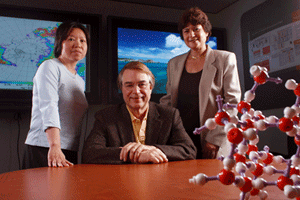Research Highlights
September 2008
New Institute Aims to Outpace Climate Change
Tiny particles in the air hold the secrets to better climate change predictions and energy management decisions. A new collaboration aims to unlock those secrets.

(Left to right) Drs. Ruby Leung from PNNL, Larry Smarr from UCSD, and Institute co-director Charlette Geffen from PNNL discuss computational science tools that can aid climate science collaborations.
The two institutions are working together to tackle the role of aerosols in climate change, specifically, how aerosols from pollution, oceans, and wildfires contribute to shifting weather. Co-directing the institute are PNNL's Dr. Charlette Geffen and UC San Diego's Dr. Kim Prather. Geffen directs PNNL's Atmospheric Sciences and Global Change Division in Richland, Wash. Prather holds appointments in both the Department of Chemistry and Biochemistry and the Scripps Institution of Oceanography at UC San Diego.
Scientists, faculty, and students will collaborate at both locations, carrying out research and development projects for government and commercial customers. The result: More precise predictions of climate change and its effects. Ultimately, this means better information for decision-makers who manage energy demands and natural resources.
The Institute will draw on complementary work in aerosol chemistry, atmospheric and oceanic science, and climate change modeling at the two organizations. One of the first collaborative projects will be to build an observatory on the pier at the Scripps Institution of Oceanography, to help reveal how aerosols from other parts of the world influence regional climate.
The agreement will bring graduate students from UC San Diego to PNNL's campus. PNNL researchers will serve as adjunct professors at UC San Diego, helping advise environmental chemistry and climate science students.
Acknowledgments: The Aerosol Chemistry and Climate Institute (see a press release announcing the Institute) is a partnership of the Pacific Northwest National Laboratory and the University of California, San Diego. The Institute represents one of the ways PNNL is helping transform the nation's ability to predict climate change and its impacts. Funding for the Institute's activities comes from the U.S. Department of Energy's Office of Science and other research sponsors.
